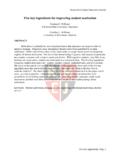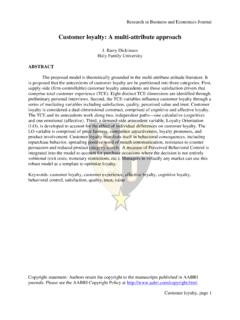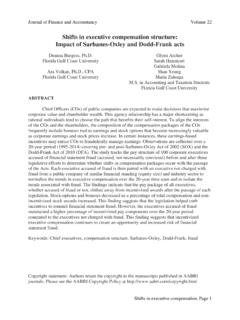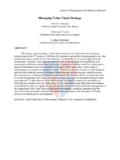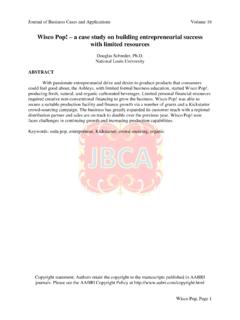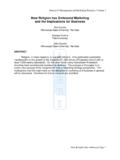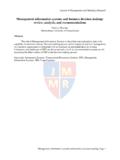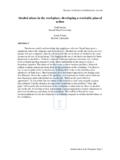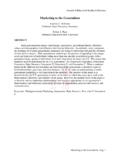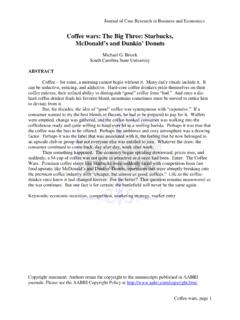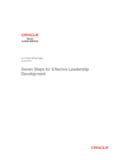Transcription of The role of integrity in individual and effective ...
1 Journal of Academic and Business Ethics The role of integrity , Page 1 The role of integrity in individual and effective corporate leadership Jan Warren Duggar Holy Family University Abstract This paper focuses on the issues of the integrity of the individual and its importance at the corporate level in creating a culture of integrity . individuals that have integrity build trusting relationships with others. At the corporate level it takes individuals of integrity to develop a consensus around shared values. As this consensus builds, the corporation develops a culture of integrity . A culture of integrity creates a highly valued work environment; it impacts the quality of corporate governance; and it provides a foundation for solid long-term financial performance.
2 Keywords: integrity , corporate culture of integrity , great places to work, partnerships, long-term financial performance Journal of Academic and Business Ethics The role of integrity , Page 2 Introduction There is a great deal of lip service paid to the role of integrity in leadership circles; however, integrity means different things to different people and varies based upon circumstances. This paper focuses on the issue of the integrity of the individual and its importance at the corporate level in creating a culture of integrity . With an individual of integrity , we talk about the character of the person and our trust and belief in this individual . At the corporate level, we talk about leaders that have created a corporate culture of integrity that provides consistency, trust, and predictable results.
3 This paper maintains that integrity , both in individuals as leaders and in the corporate culture, is necessary for long term success and corporate sustainability. individual integrity At the individual level, integrity is more than ethics; it is all about the character of the individual . It is those characteristics of an individual that are consistently considerate, compassionate, transparent, honest, and ethical. The characteristic of trust is closely associated with integrity . While the definition may seem vague, we characterize individuals with integrity as individuals that we can count on to do consistently what is right and what is expected of them. They are reliable and predictable in dealing with others and with issues, and they are defenders of what is fair, just, and acceptable.
4 In the Turknett leadership Character Model, developed by psychologist Dr. Robert Turknett, integrity is the foundation of the model, and without integrity , no leader can be successful. The Turknett leadership Group notes that individuals of integrity will not twist facts for personal advantage; they are willing to stand up for and defend what is right; they will be careful to keep promises; and they can be counted on to tell the truth. In their model, integrity is the foundation of leadership and it involves a careful balance between respect and responsibility (Turknett, ). In his discussion of individual and corporate values, James H. Quigley, Global CEO of Deloitte Touche Tohmatsu, emphasizes the critical role of trust in the professional success of an individual .
5 He states: Simply put, those who bend rules are not considered trustworthy, and without trust an individual s value is severely diminished. Without trust and confidence, markets do not function, and value is destroyed. (Quigley, 2007, ). Quigley goes on to note the critical importance of integrity and character in the workplace. Lacking trust, competencies are meaningless. individuals who are not trustworthy will not be given opportunities or responsibilities, and they will not be wanted as team members by clients or other employees (Quigley, 2007). Professionals who have worked with personnel who lacked integrity talk about the inability to count on individuals to do what they have said they would do, environments where the focus has gone from customers to protecting oneself, and where leaders are unwilling to live by the values that they publicly espouse.
6 corporate Culture of integrity At the corporate level, integrity refers to the culture, policies, and leadership philosophy. A culture of integrity has to start at the top and be seen in the conduct and activities of the Journal of Academic and Business Ethics The role of integrity , Page 3 executives. The leadership of the corporation must develop a consensus around shared values. As Kouzes and Posner (2002, pp. 79-80) point out, the development of shared values improves the work environment and productivity: It strengthens personal effectiveness, corporate loyalty, and ethical behavior It fosters team work, corporate pride and consensus Corporations that have these values outperform other firms by a wide margin in terms of revenue growth, job creation, stock price and profitability (Kouzes and Posner, ).
7 It is important for an individual to search for an employer with similar values. This match will be a key factor in one s ability to grow professionally and gain experience. As Quigley (2007) has pointed out, the culture of integrity may be far more important than the starting salary in one s quest for personal and professional fulfillment. He notes that corporations with a culture of integrity : Offer support to employees through colleagues and processes in place; consultation with other is seen as a strength rather than a weakness, and Supports a work-life balance as it reduces job stress, balances one s perspective, and contributes to job satisfaction (Quigley, 2007, p. 15). When we have trust in our dealings with a corporation it is usually because the leadership of the company has created a culture of integrity .
8 We believe that our relationship with the corporation will be predictable, reliable, and consistent in meeting our needs and requirements. The corporation has a leadership and governance system that successfully identifies and manages risk so that corporate activities can be transparent and predictable/reliable. It also means that if things are not going well, information will be shared so that employees can understand the situation and have the opportunity to contribute to the solution. CoveyLink Worldwide (2006) speaks of the importance of trust because trust always affects the outcomes in terms of speed and cost. If there is a lack of trust, the speed on the transaction will go down and the cost will go up. In short, trust has a favorable impact on the economics of the relationship; trust pays a dividend in terms of speed and reduced cost.
9 Establishing a culture of integrity engenders trust and increases efficiency. In contrast, the characteristics of low integrity organizations are: High employee turnover rates, Lack of trust (suspicion and paranoia), honesty, and transparency, Broken promises, Disrespect - officers disparage colleagues or a category of employees, Buck-passing - others are blamed for problems, Unexpected financial events occur, Reluctance to put policies and procedures into written format, Exaggeration of leadership accomplishments, and Limited board access to information, officers, and employees. High integrity organizations are characterized as organizations that are collaborative, constructive, innovative, transparent, with high employee morale, valued customer loyalty, and strong partnerships.
10 They build teams and create value. Studies have shown that corporations with a culture of integrity tend to have governance systems with higher external ratings and higher quality of earnings. They tend to be good places to work, competitive in their markets, and provide higher, more predictable returns to investors. Journal of Academic and Business Ethics The role of integrity , Page 4 integrity and Performance The integrity hypothesis assumes that individual leaders of integrity can create a consensus around a culture of integrity within a corporation. This culture of integrity , in turn, will create a highly-valued work environment; the corporation will operate with its focus on the long-run good of its customers, employees and investors; and, as a result of this focus, the corporation will excel in terms of financial performance when compared to its peers.
